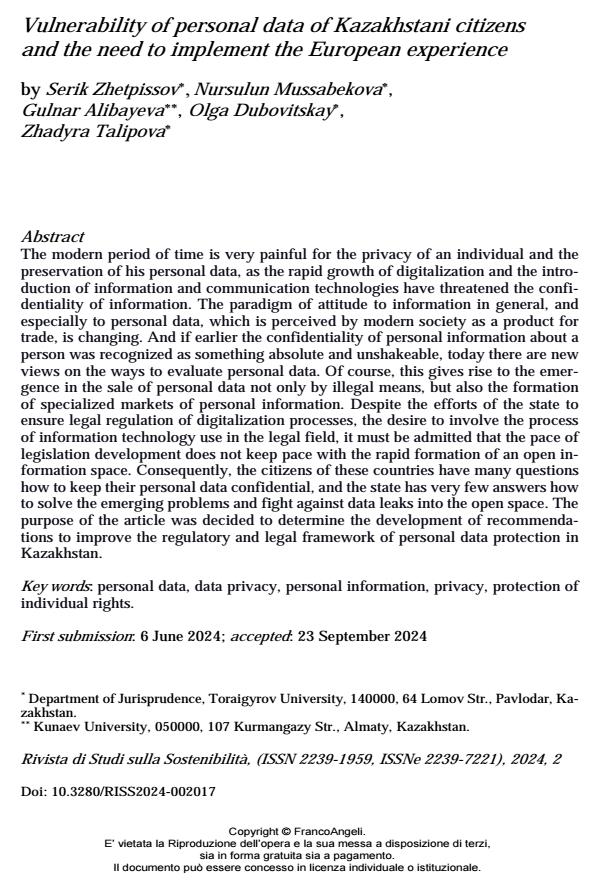Vulnerability of personal data of Kazakhstani citizens and the need to implement the European experience
Journal title RIVISTA DI STUDI SULLA SOSTENIBILITA'
Author/s Serik Zhetpissov, Nursulun Mussabekova, Gulnar Alibayeva, Olga Dubovitskay, Zhadyra Talipova
Publishing Year 2024 Issue 2024/2
Language English Pages 19 P. 305-323 File size 212 KB
DOI 10.3280/RISS2024-002017
DOI is like a bar code for intellectual property: to have more infomation
click here
Below, you can see the article first page
If you want to buy this article in PDF format, you can do it, following the instructions to buy download credits

FrancoAngeli is member of Publishers International Linking Association, Inc (PILA), a not-for-profit association which run the CrossRef service enabling links to and from online scholarly content.
The modern period of time is very painful for the privacy of an individual and the preservation of his personal data, as the rapid growth of digitalization and the in-troduction of information and communication technologies have threatened the confidentiality of information. The paradigm of attitude to information in general, and especially to personal data, which is perceived by modern society as a product for trade, is changing. And if earlier the confidentiality of personal information about a person was recognized as something absolute and unshakeable, today there are new views on the ways to evaluate personal data. Of course, this gives rise to the emergence in the sale of personal data not only by illegal means, but al-so the formation of specialized markets of personal information. Despite the ef-forts of the state to ensure legal regulation of digitalization processes, the desire to involve the process of information technology use in the legal field, it must be ad-mitted that the pace of legislation development does not keep pace with the rapid formation of an open information space. Consequently, the citizens of these coun-tries have many questions how to keep their personal data confidential, and the state has very few answers how to solve the emerging problems and fight against data leaks into the open space. The purpose of the article was decided to deter-mine the development of recommendations to improve the regulatory and legal framework of personal data protection in Kazakhstan.
Keywords: personal data, data privacy, personal information, privacy, protection of individual rights
Serik Zhetpissov, Nursulun Mussabekova, Gulnar Alibayeva, Olga Dubovitskay, Zhadyra Talipova, Vulnerability of personal data of Kazakhstani citizens and the need to implement the European experience in "RIVISTA DI STUDI SULLA SOSTENIBILITA'" 2/2024, pp 305-323, DOI: 10.3280/RISS2024-002017